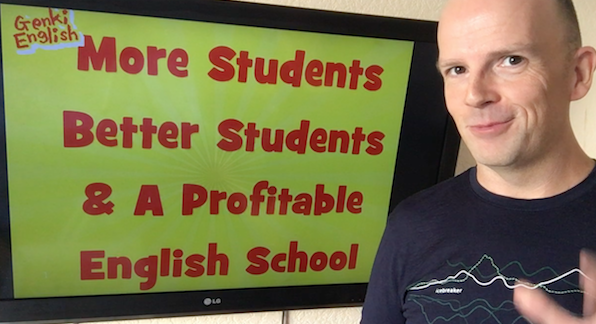
Today we had a private full day workshop for a new set of schools in Tokyo. The cool thing was that the participants were all creative professionals (we had a professional singer, dancer, orchestral percussionist and 2 movie producers!) who are going to be using their talents alongside the Genki English curriculum for premium style English classes.
It’s quite an exciting way of doing things, and everyone was really great.
Being creative types though the questions we had in the beginning were a little different to say the least! As well as the usual, discipline, which style of teaching etc. we also had some funky ones such as:
* Do the children love me?
* Should we feed them?
* What happens to bullies?
* Do the kids really want to be there?
* Am I qualified?
* Is it OK to yell?
* Should I be friends with the students?
At first I thought they were kidding, but no these were real deep questions they were genuinely asking!
So I might as well write up my answers for you guys here…
Do the children love me?
A very deep question. The answer we came up with is “yes”.
Should we feed them?
No. Although everyone loves candy, allergies, diets and all the other concerns of modern life mean an over abundance of caution is probably the better course. You wouldn’t want to kill a kid with candy. In most public schools giving the children food is banned anyway.
What happens to bullies?
They all live a life of misery? If only! This went back to the usual discipline questions.
Do the kids really want to be there?
In the beginning, probably not. Our job is to make the lessons as exciting, challenging and inviting as the latest Playstation game, so that after the first lesson is over they really do want to be there, every week!
Am I qualified?
If you speak English and are passionate about what you are doing, you are more qualified that 99.9% of English teachers in the world. From then on it’s just a case of learning as much as you can about your chosen art, from books, videos and the net and real life experience.
Is it OK to yell?
No. Getting angry is the final resort and once you go there you’ve nothing left. This doesn’t mean you mustn’t discipline. As with any type of management “strong and calm” is the key. But never get angry.
“A man is about as big as the things that make him angry” says Winston Churchill.
Should I be friends with the students?
Different people have different thoughts on this, but I’d say “Be friendly but not necessarily friends”. With adult students who are friends it can get a little blurred, but just make sure your role is as the teacher in class time and everything should work out fine.
Thanks to everyone for today, and I look forward to seeing how you guys get along with the real Genki English lessons!
Anyway, what are your thoughts on the above questions? We’d all love to hear them in the comments below!




Cool questions. Especially the one asking if the kids really want to be there. I have this problem with a private afternoon course I’m running at the moment. The parents of 3 or 4 boys want their 7 year old boys to learn English with me. Their offspring definitely have different opinions. Even though we always manage to end each lesson on a high note with smiling faces, the following lesson starts off with a very rebellious attitude from these kids.
Really interesting questions and actually ones that I have thought about more than once.I had all the problems in one group some weeks ago when I held a little workshop. Some complained they don’t get candy, others were only pushed by the parents (in addition to that it was the director of the school, so imagine the attitude of the kids), one kid always got bullied by others .. etc. all that lead me to asking myself if I’m really qualified (lol), but thank God the response to the workshop was great, so I guess it wasn’t as bad as I made it in my head. Sometimes I think we teachers put very high aims in our heads and are unsatisfied when it doesn’t work out the way we would like them to, but in the end the kids and parents are still happy and a little wiser 🙂
Nice.
Where are these schools, out of interest?
Interesting questions!
For the “Do the kids really want to be there?”
I used to have this problem when I was teaching for another school years and years ago. Though the teachers were free to teach any way they wanted and we all did a good job there were always some kid who came because their mothers told them.
I was so fed up of “It’s all my mothers selfishness; I don’t want to be here” .
So, when starting to teach at home I changed the system:
I talk to the kids one by one, to hear from their mouth wether they want to learn English or not. (After a sample lesson, of course)
Of course the first step to come here is usually the mothers, but I tell them right from the beginning, that I want to talk to their kids and have their word.
It’s amazing, because, since I do so, even the smallest ones love their time here.
There are some exceptions where I broke my rule and thought the mothers word was enough; but all those cases went wrong.
I’m even thinking to have the kids write me down something, or maybe draw me a picture , as kind of a “contract” from this Spring.
The “Not to yell” :
Of course I do agree and I don’t yell, but I must admit, I do get angry. It’s only one class, where I really get angry; since years and years. It’s a very weird group, in some way.
They have been to a buddhistic Kindergarten since they were Babies and have had really strict discipline and rules with few “creative” moments to just run around. So, it seems that they just need borders rules, structures more than other children and I must admit I’m not really good in focussing on those all the time.
I probably should practice this . They are my best class and they are really fun.
Well, I have to watch myself and take some notes.
I sort of had the same problem once with the bad behaviour. I was in a new country; new kids, new culture and my friendly playful way just didn’t work as it did in my home country. I felt like a total beginner teacher and often went to the headmaster to get advice on how to deal with them. Advice was usually “you can shout, no problem”, but it is not in my personality to shout nor do I think it will help the children enjoy the classes. So I invented some other sort of “punishment” for missbehaviour and it worked quite well. Not always, but once the children know you are not joking when you say NO, it is getting better. Though I guess some children just need more structures and limits than others. I didn’t figure out if it is also a cultural thing or simply personality.
The feeling of being qualified to do this is a nagging concern of mine. Like many ALTs I have had very little preparation before starting my teaching at public schools (my company provided almost zero training besides how to fill in admin forms) I did several TEFL courses and try to educate myself the best I can (this site being a great resource of course) but I still feel out of my depth often. I have the passion but because none of the other teachers I work with feel the same about English it is gettting so hard to keep the momentum. I wish I worked at a school like this in Tokyo!
Actually I have a question on the discipline side of things (again!). What do you suggest to ALT’s with their own classrooms, which have kids come for cleaning time? I have a different group of 2nd graders each week come to “help me out”, though the reality is that this is invariably my most stressful part of the day, every day. I’ve tried talking to homeroom teachers, offering stickers, you name it, but at the end of the day goofing off and running around seems to win out over all these other things. Just wondered what you would do in the same position.